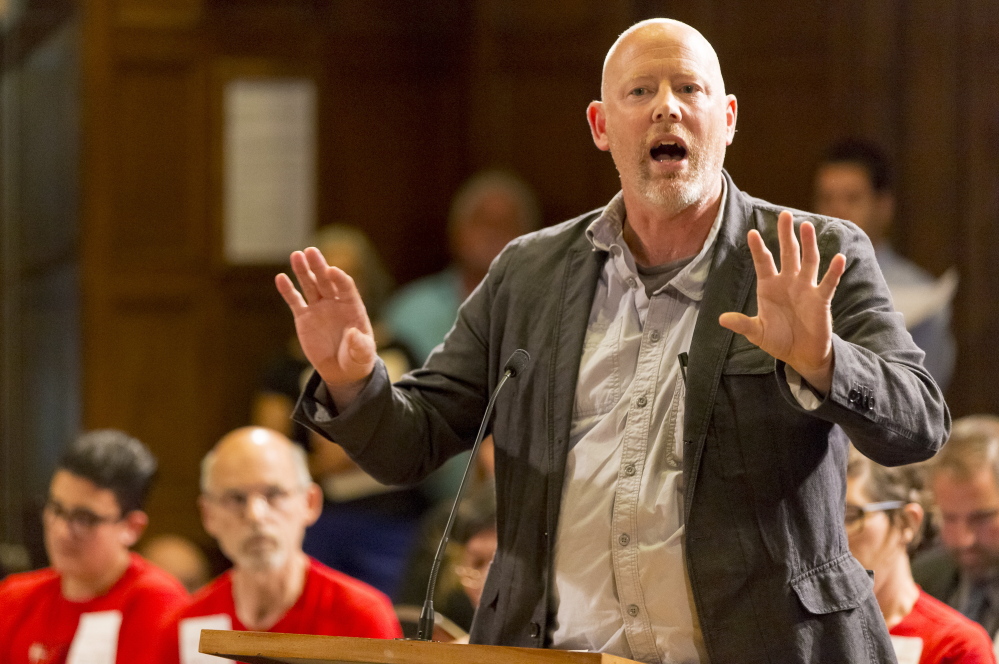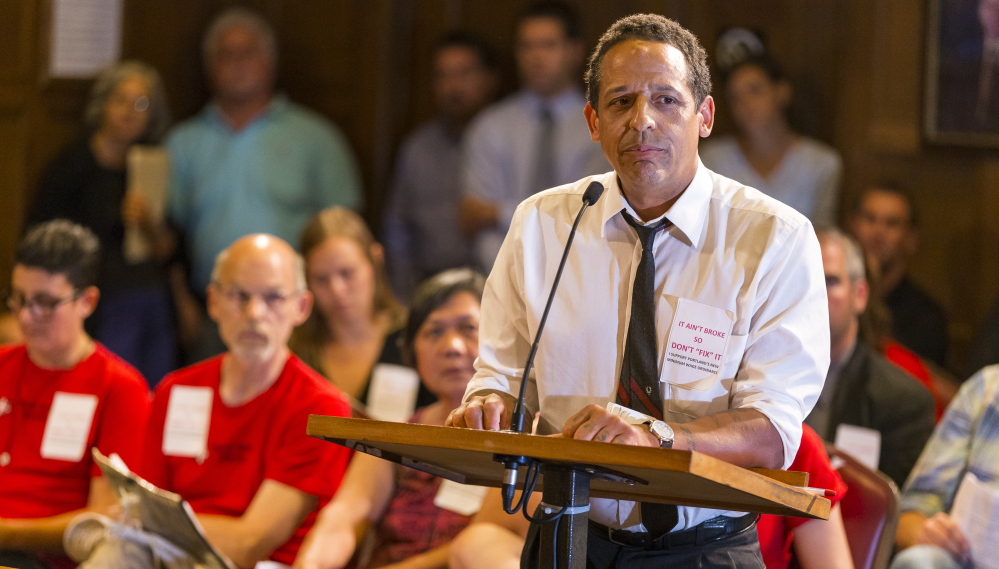The Portland City Council voted 7-2 Wednesday night to reverse a previous decision to increase the base wage of tipped workers by nearly $3 an hour, deciding to keep it at $3.75.
The council originally voted to increase the minimum wage in July. At the time, they had intended to keep the base wage of tipped workers – largely restaurant servers – at half of the state minimum wage of $7.50, but inadvertently increased it to $6.35.
After learning of the mistake, councilors moved to reconsider the ordinance while being pressured by progressive groups such as the Maine Women’s Lobby, Maine People’s Alliance and the Portland Green Independent Committee to leave the vote intact.
The Greens are trying to raise the minimum wage in Portland to $15 an hour through a citywide referendum this fall, while the Maine People’s Alliance is pursuing a statewide increase through a 2016 referendum.
However, a majority of councilors voted to honor their original intent on Wednesday night, noting that employers would still be required to ensure their workers make at least $10.10 an hour, including tips, starting Jan. 1.
“Tonight we have an important opportunity to fix an acknowledged mistake,” Councilor Justin Costa said.
Councilors David Marshall and Kevin Donoghue voted against the change because they wanted tipped workers to make half of the city wage. Starting next year, that rate would have been $5.05.
The state’s minimum wage of $7.50 an hour is 25 cents an hour higher the federal rate, but it hasn’t been increased since 2009.
Mayor Michael Brennan announced his intentions to adopt a citywide minimum wage in his 2014 State of the City address. The effort drew stiff opposition from the city’s influential restaurant industry, which argued that including tipped workers would force them to give raises to their highest-paid employees.
As a compromise, Brennan sought to exempt tipped workers, so the proposal could move forward.
On July 6, the council voted 6-3 to increase the minimum wage to $10.10 an hour starting Jan. 1, with Councilors Nicholas Mavodones, David Brenerman and Edward Suslovic opposed.
The wage will rise to $10.68 an hour in 2017, and starting in 2018 it will increase on July 1 at the same rate as the Consumer Price Index, which accounts for inflation.
The proposal doesn’t create a lower, training wage for workers 16 or under. An amendment to create one failed by a 6-3 vote.
During a two-hour public hearing, progressive groups urged the council pass as liberal an increase as possible, while business owners asked the council to be as conservative as possible.
Progressive groups, as well as several servers, asked the council to preserve the increases in the base wages of tipped employees and tie future raises to inflation, while opposing the creation of a training wage that is less than the minimum wage for workers under the ages 16 or under.
“We really need to stand with working people,” said John Newton of the Maine AFL-CIO. “It’s important we support the most vulnerable of us.”
Julia Legler of Portland, who waitresses downtown, said having a subminimum wage for tipped workers provides an unreliable source of income, especially in the winter, when business slows and hours are reduced.
Legler, 24, said she is occasionally subjected to harassment from customers. Since she relies on tips, she said she is faced with a decision: Stand up for herself and possibly lose money, or accept the behavior, so she can get paid.
“I don’t think there is any reason not to take the opportunity here to do what’s right,” said Legler, who acknowledged that it is a cultural norm to tip servers. “I shouldn’t have to rely on cultural norms to make a living.”
The Maine Restaurant Association and several restaurant owners took the opposite position, asking the council to keep the minimum wage of tipped workers at half of the state’s minimum, eliminate indexing future increases to keep pace with inflation and adopting a training wage for younger workers.
Several restaurant owners gave councilors estimates of what it would cost them to raise the base wage of tipped workers: $236,000 for Dimillo’s, up to $70,000 for Bruno’s, $80,000 for Five Fifty-Five, $40,000 at Rivalries, and $25,000 for the Embassy Suites.
Bob Napolitano said he has owned and operated Bruno’s for the last 34 years, “but this could be my last if you don’t keep the tipped wage” at the state level.
Pat’s Pizza on Market Street would be forced to cut eight positions, according to the owner, and Margarita’s closed its Brown Street location over uncertainty of the new wages.
“Please don’t force us to close our doors and leave this great city,” Rivalries owner Lance Meader said.
Tom Radomski, who works for Margarita’s, said the company entertained – and ultimately accepted – an offer on its Brown Street location only after the council vote in July, because it would have turned a profit into a loss.
The company still has a few years left on the lease of its St. John Street location, but is looking at locations outside of Portland, he said.
“We’re going to see how this plays out,” Radomski said. “We need to see what happens from a profitability standpoint.”
Send questions/comments to the editors.





Success. Please wait for the page to reload. If the page does not reload within 5 seconds, please refresh the page.
Enter your email and password to access comments.
Hi, to comment on stories you must . This profile is in addition to your subscription and website login.
Already have a commenting profile? .
Invalid username/password.
Please check your email to confirm and complete your registration.
Only subscribers are eligible to post comments. Please subscribe or login first for digital access. Here’s why.
Use the form below to reset your password. When you've submitted your account email, we will send an email with a reset code.